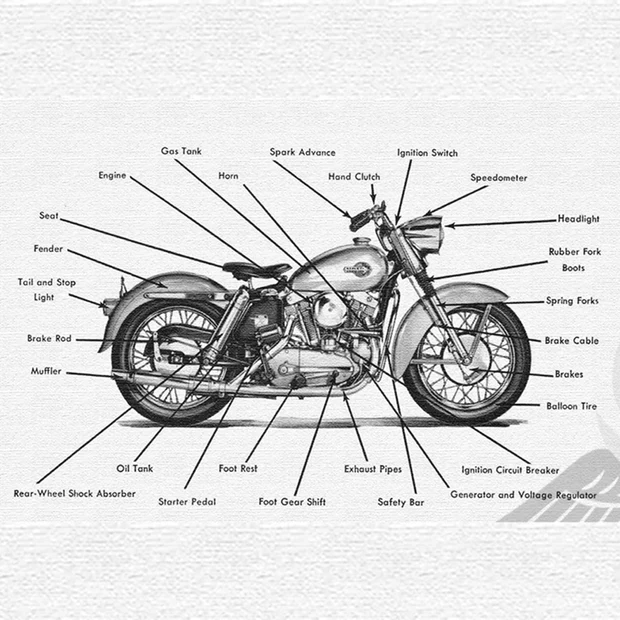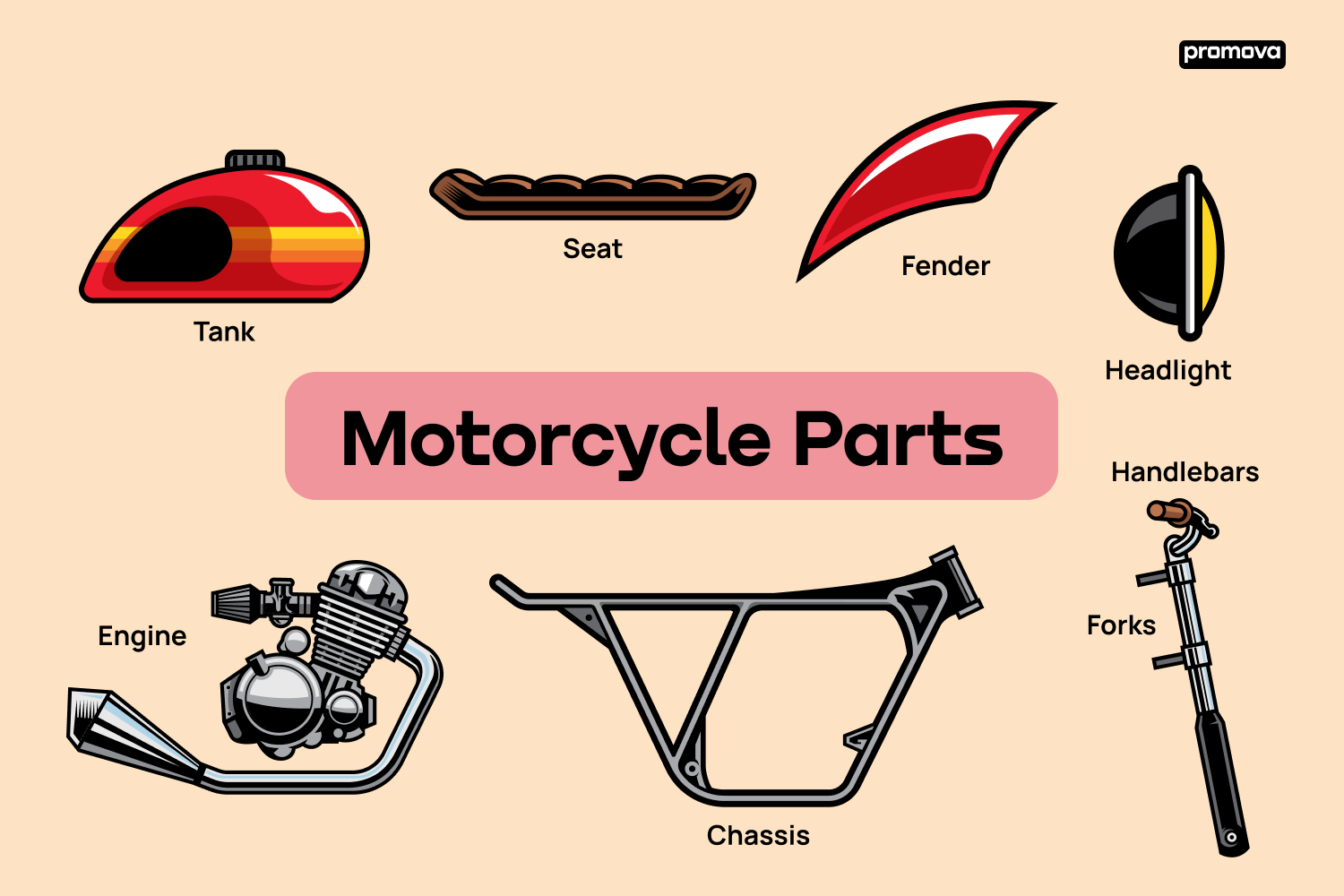The Best Tools to Keep Your Motorcycle Spares Christchurch in Working Order
The Best Tools to Keep Your Motorcycle Spares Christchurch in Working Order
Blog Article
Discover the Important Motorcycle Parts You Need for Optimal Efficiency
Comprehending the crucial parts of a bike is fundamental for attaining peak efficiency. Each part, from the engine to the braking system, plays a crucial role in general capability and safety. Routine maintenance can protect against unexpected failures and improve the riding experience. Many bikers forget the complexities of these systems. Discovering how they function with each other can bring about an extra efficient ride. What important components should every biker prioritize?
The Engine: The Heart of Your Motorbike
The engine functions as the core element of a motorbike, driving its efficiency and defining its abilities. It is accountable for transforming fuel into power, which powers the bike forward. Different sorts of engines are employed, consisting of single-cylinder, V-twin, and inline arrangements, each offering unique attributes matched for various riding designs and objectives. The engine size, normally determined in cubic centimeters (cc), substantially affects efficiency, with larger engines typically giving more power and torque.Furthermore, the engine's style and innovation, such as gas shot systems or air-cooling versus liquid-cooling, affect efficiency and reliability. Maintenance is crucial for peak procedure; aspects like routine oil changes and checking ignition system warranty longevity. Riders frequently consider an engine's responsiveness and smoothness, as these features improve the overall riding experience. Ultimately, the engine stays a vital component that specifies not only the bike's efficiency yet also the motorcyclist's link to the maker.
The Transmission: Shifting Gears Efficiently
The transmission plays an important duty in a motorbike's efficiency, particularly in the mechanics of gear shifting. Recognizing exactly how to move equipments smoothly can boost the general riding experience, while normal upkeep warranties peak performance. Appropriate focus to these aspects can substantially affect the durability and performance of the motorcycle.

Gear Shifting Mechanics
Smooth equipment changing is vital for optimal motorcycle performance, considerably impacting both velocity and control. The technicians of equipment moving entail the interaction between the clutch, gear lever, and transmission system. When a motorcyclist involves the clutch, it disengages the engine from the transmission, allowing for an equipment modification without damaging the elements. A well-timed launch of the clutch, integrated with accurate motion of the equipment bar, assists in a seamless change between gears. This procedure assures that the engine operates within its finest power band, enhancing performance. Motorcycle Spares Christchurch. In addition, recognizing the gear proportions and their result on speed and torque can help bikers make educated choices during shifts, inevitably adding to a much more responsive and satisfying riding experience
Upkeep Tips Relevance
Routine maintenance plays a crucial role in ensuring that the transmission system operates effectively, enabling for smooth equipment shifts. Routinely altering the transmission and inspecting fluid is crucial, as old fluid can lead to increased rubbing and wear. In addition, examining the clutch for wear assurances peak interaction and disengagement, avoiding slippage during gear changes. Lubrication of moving parts is just as important to decrease rubbing and enhance performance. Bike owners need to additionally check for leakages and uncommon noises, as these can indicate underlying issues. By adhering to these maintenance ideas, riders can prolong the life expectancy of their transmission system, guaranteeing that equipment changes stay seamless and adding to the general efficiency of their motorbike.
The Braking System: Ensuring Safety And Security on Every Experience
Braking systems are essential parts that directly influence a motorcycle's security and efficiency. They include various components, consisting of brake pads, rotors, calipers, and hydraulic lines, all interacting to guarantee reliable slowdown. The sort of stopping system-- generally either disc or drum-- affects responsiveness and quiting power.Regular upkeep is important to promote peak efficiency; used brake pads can lead to reduced effectiveness and enhanced stopping distances. Furthermore, the top quality of brake fluid need to be kept track of, as it can take in wetness gradually, compromising stopping efficiency.Riders must also take into consideration the relevance of anti-lock braking systems (ABS), which avoid wheel lockup during sudden stops, boosting overall security. Appropriately functioning brakes are not almost stopping; they impart confidence in the cyclist, enabling much safer navigating with numerous surfaces. Eventually, a trustworthy stopping system is important for delighting in every trip with comfort.
The Suspension: Enhancing Convenience and Control
A well-functioning shock absorber considerably contributes to a motorbike's overall efficiency, matching the performance of the braking system. The suspension plays a considerable role in taking in shocks from irregular surface areas, guaranteeing a smoother adventure while preserving tire call with the road. This contact is important for both stability and control, permitting cyclists to browse edges with self-confidence and precision.Different kinds of shock absorber, such as telescopic forks or mono-shocks, offer varying degrees of comfort and handling. Correctly tuned suspension enhances responsiveness, giving the biker with a more connected feel to the motorcycle. Regular maintenance checks are very important to ascertain the suspension elements, consisting of springtimes and dampers, are operating at their best. An efficient suspension system not just navigate to these guys elevates the riding experience yet likewise adds to the longevity of various other motorcycle parts by reducing damage. Therefore, purchasing top quality suspension is vital for any type of major motorcycle lover.
The Tires: Connecting You to the Road
Tires play a necessary duty in a motorbike's performance, working as the key link between the biker and the road. Comprehending the various sorts of tires readily available can greatly affect taking care of and safety and security. Furthermore, normal upkeep is vital to guarantee peak tire performance and durability.
Tire Enters Explained
Exactly how do various tire types influence a motorcycle's performance? Tire types play an essential role in determining a motorbike's handling, stability, and grasp. Sporting activity tires, developed for high efficiency, deal enhanced grip and responsiveness on paved roads, making them excellent for competing and aggressive riding. On the other hand, touring tires prioritize sturdiness and comfort, giving a smoother adventure for long-distance traveling. Off-road tires, defined by their tough walk patterns, excel in traction on unpaved surface areas, ideal for experience lovers. Additionally, dual-sport tires blend characteristics from both on-road and off-road classifications, satisfying functional riding needs. Ultimately, picking the right tire type is crucial for optimizing performance, ensuring safety and security, and boosting the general riding experience.
Maintenance Tips Offered
While riding when traveling, preserving ideal tire condition is important for safety and security and performance. On a regular basis checking tire stress is essential, as under-inflated tires can bring about bad handling and increased wear. It is suggested to examine walk deepness regularly; worn tires compromise hold and security. In addition, motorcyclists must try to find indicators of damage, such as bulges or splits, which can indicate the requirement for replacement. Turning tires occasionally guarantees also put on, boosting long life. Moreover, keeping tires clean from particles and preventing extreme Visit Website visuals can extend their life-span. Maintaining appropriate alignment and balance contributes to peak efficiency, minimizing tension on various other bike elements. Sticking to these upkeep pointers will greatly enhance the overall riding experience.
The Fuel System: Fueling Performance and Efficiency
The gas system plays an important function in making best use of a motorbike's performance and effectiveness, as it assures the ideal shipment of fuel to the engine. It makes up numerous crucial components, including the fuel tank, fuel pump, gas filter, and fuel injectors or carburetor. Each part should work efficiently to guarantee a effective and smooth ride.The gas container stores fuel and supplies it to the engine through the fuel pump, which produces the needed stress. A fuel filter protects against impurities from going into the engine, while the injectors or carburetor mix fuel with air for combustion.Proper maintenance of the gas system is essential; a blocked filter or malfunctioning injector can lead to lowered performance and increased gas intake. By validating that the gas system operates successfully, cyclists can delight in improved throttle response, far better fuel economic situation, and on the whole boosted riding experience.
The Electrical System: Powering Your Trip
An effective electric system is vital for the general capability and security of a motorbike, as it powers essential components such as the ignition, lights, and different digital systems. This system includes the battery, which stores energy, and the generator, accountable for generating power while the engine runs. The circuitry harness connects these elements, making certain reputable power distribution.Additionally, fuses secure the system from overloads, while relays aid regulate high-current tools with low-power signals. A properly maintained electric system improves performance by making sure smooth begins and consistent procedure of signals and lights, vital for biker visibility and safety.Regular checks of the battery's cost and links are very important for protecting against electric failures. Motorcyclists must also check circuitry for damage, guaranteeing all elements operate preferably. Ultimately, a robust electrical system contributes significantly to the overall performance and integrity of the motorbike.
Often Asked Inquiries
Just how Typically Should I Replace My Motorbike's Battery?
The regularity of motorcycle battery replacement depends upon use and upkeep (Bike Parts Wellington). Typically, batteries ought to be replaced every three to five years. Normal checks can help identify when a replacement is essential for peak efficiency
What Devices Do I Need for Basic Motorcycle Maintenance?
For basic motorcycle maintenance, one requires necessary devices such as an outlet collection, wrenches, screwdrivers, pliers, tire stress gauge, and a torque wrench. These tools promote efficient maintenance and assure the bike runs successfully and securely.
Just How Can I Improve My Motorcycle's Aerodynamics?
To enhance motorcycle the rules of aerodynamics, one must consider changing fairings, making use of windshield expansions, maximizing body position, and decreasing overall weight. These alterations help lessen drag, enhancing stability and fuel effectiveness throughout adventures.
What Are the Indications of a Failing Electrical System?
Indicators of a failing electrical system include lowering lights, problem beginning, irregular tool analyses, and blown fuses. Motorbike Components NZ. Uncommon smells or rust around battery terminals might additionally show underlying problems requiring immediate interest for security and efficiency

Just how Do I Select the Right Oil for My Motorcycle?
When picking oil for a motorbike, one must think about the supplier's specs, viscosity rankings, and the kind of riding. Furthermore, artificial versus traditional oil can impact efficiency and engine defense, influencing the choice substantially. The engine size, normally determined in cubic centimeters (cc), substantially influences next page efficiency, with bigger engines typically providing even more power and torque.Furthermore, the engine's layout and modern technology, such as gas shot systems or air-cooling versus liquid-cooling, affect effectiveness and reliability. A well-functioning suspension system significantly contributes to a motorbike's general performance, complementing the efficiency of the braking system. The fuel system plays a crucial role in taking full advantage of a motorcycle's performance and efficiency, as it assures the optimum shipment of fuel to the engine. A gas filter protects against pollutants from getting in the engine, while the injectors or carburetor mix gas with air for combustion.Proper upkeep of the gas system is vital; a clogged filter or malfunctioning injector can lead to decreased efficiency and raised gas intake. A properly maintained electric system boosts performance by ensuring smooth starts and consistent procedure of lights and signals, crucial for motorcyclist exposure and safety.Regular checks of the battery's fee and connections are vital for stopping electric failures.
Report this page